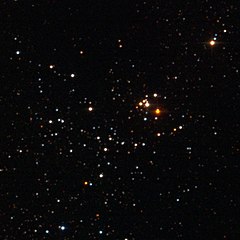Trumpler 27-1
Trumpler 27-1 is a red supergiant star that is a member of the massive, possible open cluster Trumpler-27, where a blue giant star, a yellow supergiant star , and two Wolf–Rayet stars are also located.
| Observation data Epoch J2000 Equinox J2000 | |
|---|---|
| Constellation | Scorpius |
| Right ascension | 17h 36m 10.1189s[1] |
| Declination | −33° 29′ 40.620″[1] |
| Apparent magnitude (V) | 8.79[2] |
| Characteristics | |
| Evolutionary stage | Red supergiant |
| Spectral type | M0Ia[2] |
| Astrometry | |
| Radial velocity (Rv) | −16.84 ± 0.82[1] km/s |
| Proper motion (μ) | RA: 0.223[1] mas/yr Dec.: −1.179[1] mas/yr |
| Parallax (π) | 0.4020 ± 0.0770[1] mas |
| Distance | approx. 8,000 ly (approx. 2,500 pc) |
| Details | |
| Mass | 5.86[3] M☉ |
| Radius | 1,073[4] R☉ |
| Luminosity | 215,000 - 261,000[4] L☉ |
| Surface gravity (log g) | -0.24[3] cgs |
| Temperature | 3,222[3] - 3,790[4] K |
| Metallicity [Fe/H] | +0.15[3] dex |
| Other designations | |
| Database references | |
| SIMBAD | data |
Observation History
Trumpler 27-1 was discovered and catalogued when the open cluster (not confirmed then) was first identified in the late 20th century. It has since remained unobserved, being featured in the Gaia Catalogue and other pieces of literature.[5]
Physical Properties
Trumpler 27-1 is among the largest stars known, with a radius of over 1,000 solar radii, one estimate giving 1,073 R☉ and another giving a size of over 1,300 solar radii.[5] This star's spectral type is M0Ia[4], meaning it possesses a cool temperature of below 3,800 K. So far, Trumpler 27-1 is the only identified red supergiant in the open cluster Trumpler 27.
Location
Trumpler 27-1 (and the cluster in which its located in), is in the constellation of Scorpius.
References
- Brown, A. G. A.; et al. (Gaia collaboration) (August 2018). "Gaia Data Release 2: Summary of the contents and survey properties". Astronomy & Astrophysics. 616. A1. arXiv:1804.09365. Bibcode:2018A&A...616A...1G. doi:10.1051/0004-6361/201833051.
- "CD-33 12241". SIMBAD. Centre de données astronomiques de Strasbourg. Retrieved 17 July 2020.
- Anders, F.; Khalatyan, A.; Chiappini, C.; Queiroz, A. B.; Santiago, B. X.; Jordi, C.; Girardi, L.; Brown, A. G. A.; Matijevič, G.; Monari, G.; Cantat-Gaudin, T.; Weiler, M.; Khan, S.; Miglio, A.; Carrillo, I.; Romero-Gómez, M.; Minchev, I.; De Jong, R. S.; Antoja, T.; Ramos, P.; Steinmetz, M.; Enke, H. (2019). "Photo-astrometric distances, extinctions, and astrophysical parameters for Gaia DR2 stars brighter than G = 18". Astronomy and Astrophysics. 628: A94. arXiv:1904.11302. Bibcode:2019A&A...628A..94A. doi:10.1051/0004-6361/201935765.
- Messineo, M.; Brown, A. G. A. (2019). "A Catalog of Known Galactic K-M Stars of Class I Candidate Red Supergiants in Gaia DR2". The Astronomical Journal. 158: 20. arXiv:1905.03744. Bibcode:2019AJ....158...20M. doi:10.3847/1538-3881/ab1cbd.
- Stassun K.G.; et al. (October 2019). "The revised TESS Input Catalog and Candidate Target List". The Astronomical Journal. 158 (4). arXiv:1905.10694. Bibcode:2019AJ....158..138S. doi:10.3847/1538-3881/ab3467.
